Tzar of Russia
Pronunciation:
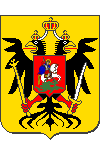
Alexander I Pavlovich Romanov (Александр I Павлович Романов) was born in Saint Petersburg on December 23, 1777. He is the eldest son of the future Tsar Paul I and of Sophie Dorothea of Württemberg.
Grandson of Catherine the Great, Alexander was separated from his father at a very young age and entrusted to the Swiss Frédéric-César de La Harpe, a disciple of the French philosophers of the 18th century, who gave him a republican education.
Torn between an unstable father and an authoritarian grandmother, who intends to directly transmit power to him, the young man contracts habits of dissimulation. He will never get rid of it and his true nature will always remain a mystery to those close to him.
On March 23, 1801, he came to power following the assassination of his father. Even if he does not took any direct part in this assassination, his participation in the plot that precedes him leaves him with an acute sense of guilt, from which he will never be able to free himself.
The beginning of his reign is placed under the sign of reforms and English influence. The latter pushes him to war. The defeat of Austerlitz (December 2, 1805), where he was physically on the battlefield, then that of Friedland (June 14, 1807), led to a rapprochement with France which resulted in the peace of Tilsitt. But this new alliance, if it was concluded in good faith by Alexander, does not resist the differences of commercial interests between the two countries.
In 1812, Alexander became the soul of the Russian national resistance against the French invader. The fall of Napoleon and the preponderant part the Tsar took in it made Alexander the arbiter of European policy.
The time when he dreamed of reforms is far away. At the height of his glory, Alexander, fallen under the influence of the visionaries with whom he surrounded himself, intends to build a new Europe around a holy alliance, conceived as a construction both absolutist and mystical, alone capable of its eyes to ensure the happiness of peoples.
During his last years, Emperor Alexander was pervaded by a growing sense of guilt, so much so that the legend of his abandonment of the throne, of his pilgrimage to the Holy Land, and of his return as the starets Fedor Kouzmitch, is perhaps more than a fable.
The official version of his death however makes him disappear on December 1, 1825, of a malaria crisis, in Taganrog, and be buried in the Peter and Paul Cathedral, in Saint Petersburg.
His younger brother Nicolas succeeds him on the imperial throne.
"Tsar Alexander I". Russian painting, XIXth century.
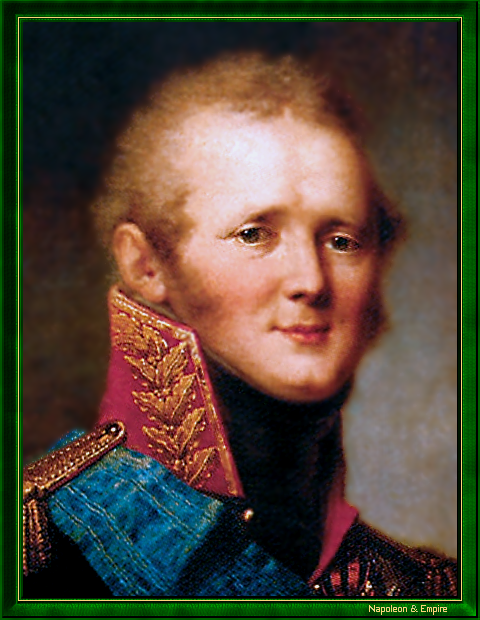
He married in 1793 Louise Augusta de Bade (known as Elisabeth Alexeievna); the couple will have two daughters, who will die in infancy.
All the dates on this page are in the Gregorian calendar (then eleven then twelve days ahead of the Julian calendar in use in Russia at that time).
Other portraits
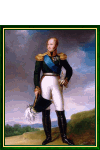
Enlarge
"Portrait of Tsar Alexander I" by François Pascal Simon Gérard (Rome 1770 - Paris 1837).
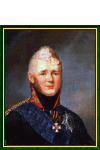
Enlarge
"Tsar Alexander I" by Stepan Semenovich Shchukin (1758 or 1762 - 1828).
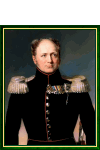
Enlarge
"Tsar Alexander I (detail)" by George Dawe (St James's, Westminster 1781 - Kentish Town 1829).
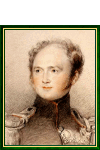
Enlarge
"Tsar Alexander I". Drawed in 1818 by Thomas Lawrence (Bristol 1769 - London 1830).